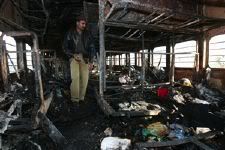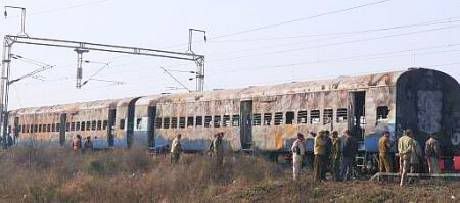Adil Najam
In a tragic development – and what is clearly the most serious threat to recent headways in the India-Pakistan peace process – a train bound from India to Pakistan (Samjhota Express) caught fire, reportedly because of two crude home-made bombs which exploded. Over 60 people are reported dead, most of them Pakistanis returning home, but the death toll also includes many Indians, including some Indian officials.


Here are some details, according to the BBC:
At least 64 people have been killed in a series of explosions and a fire on a Pakistan-bound train in the northern Indian state of Haryana, officials say. Passengers reported hearing two blasts as the train passed near Panipat, about 80km (50 miles) north of Delhi. The train – the Samjhauta Express – was part of a service taking passengers from Delhi to Lahore in Pakistan. A spokesman for Indian Prime Minister Manmohan Singh said the explosions were probably an “act of terror”. A number of other passengers were injured, and officials say the death toll may rise. The Samjhauta Express is one of two train services connecting India and Pakistan. After a two-year gap, it was reopened in 2004 as part of the peace process between the two countries.
Bloomberg adds the following information:
The blasts, which occurred after 11 p.m. last evening, were caused by crude explosives and struck two coaches of the train, India’s Railways Minister Lalu Prasad told reporters today in a televised interview in New Delhi. Pakistan condemned the blasts, saying India must conduct a thorough investigation into the act of terrorism. The train service between Indian and Pakistan is used by people who can’t afford air travel between the nuclear-armed neighbors that fought three wars since independence from British rule in 1947 and started talks to improve relations in 2003. The divided Himalayan territory of Kashmir is at the center of a dispute between the two countries that claim the region in full….
“Preliminary investigations show most of the victims are Pakistanis,” Pakistan’s foreign ministry spokeswoman Tasnim Aslam said in a phone interview from capital Islamabad today. “We expect India to conduct a thorough inquiry to find out the reasons behind this act.” The Pakistan High Commission in the Indian capital is being informed about possible casualties, zonal railways official B.N. Mathur said. A railway guard manning a signal cabin on the route between Delhi and Attari heard two explosions when the train crossed the station near Panipat, a refinery town, Mathur told reporters from the blast site….
India had the responsibility of providing security to the train in its part of the country, Aslam said, refusing to comment on the impact of the blasts on peace talks between the two countries. “We don’t know the motive behind the blasts.”

Pakistan has recently seen a spate of bombings in its major cities, and even before this some in government were pointing towards a ‘foreign hand’ in these bombings. Both countries have long played this game of ‘blame the foreign hand’, including in the recent tragic train bombings in Mumbai. The impulse to do so at the first sign of trouble is a natural one in the sub-continent. Given the deep distrust that exists between the two, it may even be understandable. But irrespective of the short-term political gains such finger-pointing might gain, it is not a very useful way to deal with deep tensions. One certainly hopes that this will not slide to that level and if, indeed, the purpose of those who did this terrible act was to hurt the peace process, then both countries will work together to make sure that this does not happen.
It is a good sign that Pakistan has announced that the visit by the Pakistan Foreign Minister to India will not be canceled. The signals from the Pakistan Foreign Ministry are sober but reasonable. According to The News:
Pakistan Foreign Minister Khurshid Kasuri Monday condemned a train blast in India which killed at least 66 people as a “horrendous act of terrorism” and said most of the victims were Pakistanis. Kasuri said he had asked the Indian government to investigate the incident overnight on a Samjhota Express. “It is a horrendous act of terrorism,” Kasuri told reporters during a function at the foreign office. “I would like the Indian government to investigate this incident. We are waiting for the results of the investigation,” he said. The minister said he had instructed the Pakistani High Commission in New Delhi to send staff to the site to help Pakistan nationals caught up in the blast.
The main leaders in India, including the Prime Minister and President, have also sent the right signals, including condolences to those who have died. The overtures from both sides are to focus on finding the terrorists who committed this atrocity. One hopes that their attentions will remain focussed on this purpose rather than succumbing to the impulse of scoring political points through the unwarranted politics of incrimination. Most of all, one hopes that neither country will allow the peace process to be derailed by this blast.




















































As certain as some of my colleagues are here that a “Hindu” organization is behind it, I am on the other end of the spectrum. The jihadi chickens have come home to roost. There is only a strong central government standing in the way of Pakistan becoming the next Iraq.
It is so terribly sad because as I was reading some verses of the Quran today, I could not help but become emotional at how twisted and wrong the ideology of these terrorists are.
What if the famous first few verses of the Quran refer to these zealots who kill in the name of religion:
[2:8] Then there are those who say, “We believe in GOD and the Last Day,” while they are not believers.
[2:9] In trying to deceive GOD and those who believe, they only deceive themselves without perceiving.
[2:10] In their minds there is a disease. Consequently, GOD augments their disease. They have incurred a painful retribution for their lying.
[2:11] When they are told, “Do not commit evil,” they say, “But we are righteous!”
[2:12] In fact, they are evildoers, but they do not perceive.
[2:13] When they are told, “Believe like the people who believed,” they say, “Shall we believe like the fools who believed?” In fact, it is they who are fools, but they do not know.
[2:14] When they meet the believers, they say, “We believe,” but when alone with their devils, they say, “We are with you; we were only mocking.”
[2:15] GOD mocks them, and leads them on in their transgressions, blundering.
[2:16] It is they who bought the straying, at the expense of guidance. Such trade never prospers, nor do they receive any guidance.
[2:17] Their example is like those who start a fire, then, as it begins to shed light around them, GOD takes away their light, leaving them in darkness, unable to see.
[2:18] Deaf, dumb, and blind; they fail to return.
Alright…maybe I got a little carried away. I think Adnan’s assessment is probably the most well-balanced.
[quote comment=”34751″]
Because there *is* certainly some truth in it.
[/quote]
Yes, there is. But my point was that elements such as the ones you describe definitely do exist in India and carry out heinous crimes all over the place. And when their crimes are reported (IF they are reported) they are described as fringe elements not necessarily attached to any religious or political group.
But when some Taliban from across the border carry out an attack…well, it has to be Pakistan-backed militants…Pakistani public supporting these actions and giving safe harbor…surely you do not believe that most Pakistanis are pro-terrorism?
Let me analyze this. On the one hand, Pakistan is supporting terrorism, is harboring Al-Qaeda, and is favoring attacks on other countries, etc.
The logic of these accusations is beyond insane…if anything, Pakistanis themselves have been dying from these attacks, the one in Quetta being a recent example.
Jyoti, I share your grief and will wait for the facts to come out.
However this discussion has moved onto a tangent which is real and should be discussed for a better understanding among us. Eidee Man and a few others have a valid point here. For Mumbai blasts pakistan was made to be on the defensive for something she didn’t do. Indian setup was so successful in doing so that the U.S. state dept. which probably knows more about what goes in pakistan than pakistan herself took a good pause before issuing their final verdict. This has been going on from long before 9/11 and at an almost every level in the international arena. At a much micro level and using a very tiny example; it wasn’t Shev Sena that blocked Aeysha Jalal’s legitimate way at Columbia University not too long ago. Was it necessary? No. But it happened.
U.S. news outlets (just like coca-cola and pepsi) have a huge market to cater to in India and their correspondents for South Asia for prime time at least are mostly Indians. It is very easy, almost delightful, for them to label pakistan as a terrorist country responsible for anything bad that goes on in that region. This my friends needs to stop if any concerted efforts are to be made for real peace. In international diplomacy, using raw french, shit happens all the time and in plain hindi or urdu it means aaj hum to kal tumhari baari he.. And as we know it is Pakistan’s turn to press the right buttons given the timing, the place, and the manner of this tragedy. Personally I think Pakistan should play a bigger heart here for the bigger good involved even though history from across the border is against it.
[quote comment=”34745″]I would echo the comments made my those who said that a terrorist is just simply a terrorist.
HOWEVER, the fact is that whenever there is any sort of killing, etc Pakistan always gets blamed; our religion, culture, and all of the people are accused of fostering and not speaking against such incidents. [/quote]
Because there *is* certainly some truth in it.
The London 7/11 bombers were all Pakistanis and not Afghanis or Iraqis whose countries were attacked and occupied. Recently six Pakistanis have been charged in UK for planning to kill returning British military personnel (incidentally of Muslim origin). Now why would Pakistanis be more worried for Afghanistan and Iraq than Afghanis or Iraqis themselves? Pakistanis seem to have this trigger-happy approach to any and all issues. The reason? Religious extremism seeped deep into our society and as a result support for acts of extremism by a significant portion of our society.
How many countries can you name where a simple act of peaceful worship or greeting can land you in jail? Pakistan is the only one as far as I am aware. This and the fact that a person is not judged on decades of his service for the country but on the basis of his personal faith and whether he offered funeral prayer or not, should tell you the primitive state that many of us live in and it is no surprise that Pakistanis do get involved in acts of terrorism more often than not and more than most other nationalities.